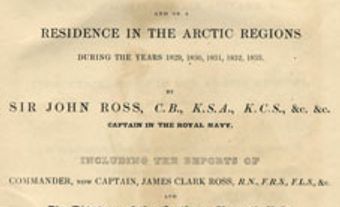He was on half pay when his uncle invited him to accompany his privately funded expedition to attempt the Northwest Passage in 1829. During the winter of 1829-30 he made a series of land expeditions on sleds which proved that BOOTHIA was a peninsula. He crossed what is now called James Ross Strait to Victory Point and reached KING WILLIAM ISLAND. On 1 June 1831 he discovered the MAGNETIC POLE on the west coast of Boothia peninsula, set up the British flag and erected a cairn.
He was later engaged to conduct a magnetic survey of the British Isles and in 1839 commanded an Antarctic expedition, spending 3 years studying magnetism and adding to the geographical knowledge of the region.
In 1848 he commanded the first expedition in the search for Sir John FRANKLIN. He discovered and surveyed Peel Sound but found no trace of the missing explorer. He was made a rear-admiral in 1856.

 Share on Facebook
Share on Facebook Share on X
Share on X Share by Email
Share by Email Share on Google Classroom
Share on Google Classroom

